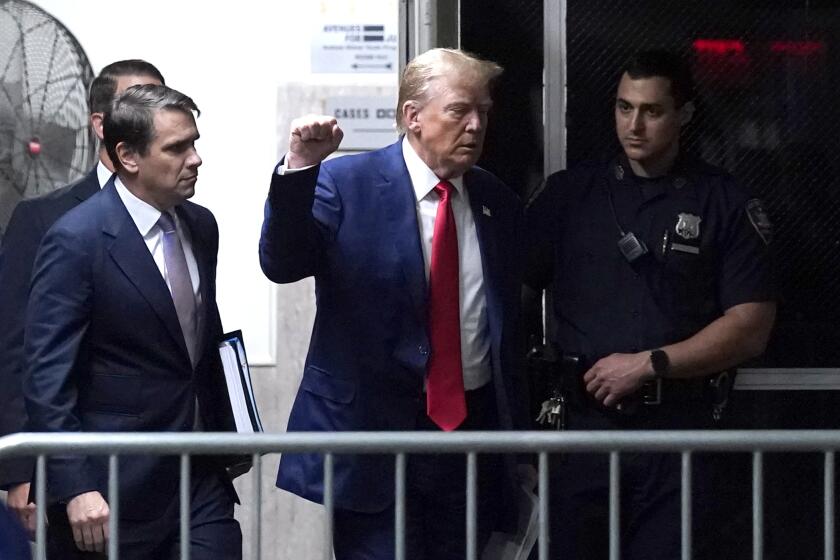Latinos Want Substance in the Form of Amnesty
Latino Democrats, with the help of some labor union allies, have found a way to top Republicans in appealing for Latino voter support this election year--a gutsy, if risky, stance on behalf of amnesty for illegal immigrant workers. Will Vice President Al Gore, the presumptive Democratic nominee for president, heed their advice?
Texas Gov. George W. Bush, the GOP nominee, still has Latinos buzzing over the show of simpatico inclusiveness that the Republicans put on two weeks ago in Philadelphia. The party that most Latinos identify with immigrant-bashing measures like Proposition 187 sought Latino votes with prime-time speeches in Spanish, mariachis and salsa music.
But it was mostly a show--the kind of symbolism, rather than substance, Democrats used to get away with when they could take Latino voters for granted. Now that Bush has made it clear he will bid for Latino votes in key states like California, the Democrats must counter.
Last week’s vote by California’s Democrat-dominated Legislature to create a state holiday honoring the late farm-labor leader Cesar Chavez was a step in that direction, but is still just symbolism. With Latinos voters feeling empowered now that both major parties are courting them, it will take substance to win them over.
That is why a grass-roots coalition of Latino, religious and labor activists are urging Democrats to take a courageous stand on the divisive issue of illegal immigration. They are using the 2000 convention to lobby Gore and Democrats in Congress to support a new amnesty for illegal immigrants who have established roots in this country.
“We want to make sure we don’t just get a smile and a pat on the back,” said Eliseo Medina, a vice president of the Service Employees International Union who is leading the pro-amnesty campaign. “Speaking to us in Spanish is very nice, but we want our political leaders to show us something real.”
The Democrats surely didn’t plan it this way, but there is no better place to grasp the importance of immigrant voters in American politics than California. This state is the modern-day Ellis Island--the port of entry where thousands of ambitious young people from abroad come pursuing the American Dream.
There was a backlash against this immigrant wave in the early ‘90s, when California’s economy was adjusting to the end of the Cold War. The nadir was Proposition 187 in 1994, but the tide has turned. Thousands of immigrants who were eligible for citizenship were frightened by the backlash into becoming citizens--fast! And they started voting in big numbers for the party that had opposed Proposition 187.
That is why Democrats now control the state Legislature, why there is but one statewide official who is a Republican--and why there is both idealism and pragmatism in the pro-amnesty stance Latino Democrats are urging on their party.
Idealism because Latino citizens are spending hard-won political capital to benefit thousands, perhaps millions, of non-citizens.
Pragmatism because at least some of the Latino immigrants who may benefit from amnesty have friends and family members who do vote. And pragmatism in the possibility that immigrants who may become citizens after another amnesty will someday also vote for Democrats.
That’s what happened with many of the 2.9 million immigrants legalized under the last big amnesty program approved by Congress, as part of the Immigration Reform and Control Act of 1986.
IRCA’s history offers a precedent well worth the attention of Gore and other Democrats.
The last time the Democrats met in California--in 1984 in San Francisco--another immigration reform issue had Latinos riled up. That year they were out to stop the Simpson-Mazzoli bill, a proposal they considered draconian, but which was on the verge of final approval by Congress.
Then, as now, the presidential nomination had been largely determined before the convention began. Walter F. Mondale was widely expected to be nominated on the first ballot. But, led by former U.S. Rep. Edward R. Roybal, of Los Angeles, many of the 340 Latino delegates there threatened to embarrass Mondale by abstaining on the first ballot as a protest against Simpson-Mazzoli.
The threat worked. Former House Speaker Jim Wright and other top Democrats struck a deal with Roybal. Simpson-Mazzoli was shelved, and an effort to draft an immigration reform law more acceptable to Latinos began when a new Congress was seated in 1985. The result of all that convention maneuvering was IRCA, and its generous amnesty, in 1986.
There are currently a half dozen bills on Capitol Hill to liberalize U.S. immigration laws, some including new amnesty programs. Inside the Washington Beltway, conventional wisdom has it that none of those bills will become law. Medina and other Latinos think they can prove the conventional wisdom wrong. Don’t count them out.
More to Read
Get the L.A. Times Politics newsletter
Deeply reported insights into legislation, politics and policy from Sacramento, Washington and beyond. In your inbox three times per week.
You may occasionally receive promotional content from the Los Angeles Times.






